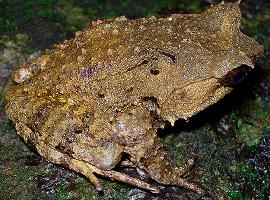
State of endangerment
| Endangered |
Animal description
The Rough horned frog, scientifically known as Borneophrys edwardinae, is a fascinating and unique species of frog that resides in the dense, humid rainforests of Borneo. This species is part of the Megophryidae family, which is known for its members' distinctive horn-like projections above their eyes, giving them a somewhat prehistoric appearance. The Rough horned frog is no exception, with its rough-textured skin and prominent supraorbital crests that contribute to its distinctive, rugged look.Borneophrys edwardinae is a relatively large frog, with females typically larger than males, a common sexual dimorphism among many frog species. The coloration of this species is a marvel of natural camouflage; its skin exhibits a mottled pattern of browns, greens, and yellows, allowing it to blend seamlessly into the leaf litter and mosses of its rainforest floor habitat. This cryptic coloration is not just for hiding from predators, but it also aids in ambushing prey, which mainly consists of insects and smaller invertebrates.
The habitat of the Rough horned frog is as intriguing as the animal itself. These frogs are found in the lowland and montane forests of Borneo, an island known for its rich biodiversity. The frogs prefer moist environments, often being found near streams, rivers, and wetlands where the humidity is high, and the vegetation is dense. This environment not only provides them with ample hiding spots from predators but also a rich hunting ground for their insectivorous diet.
Breeding for Borneophrys edwardinae occurs during the rainy season when the males call to attract females to small, temporary pools of water formed by the heavy rains. The call of the Rough horned frog is a distinctive, low-pitched croak, which can be heard resonating through the night during the breeding season. Females lay their eggs in these temporary pools, where the tadpoles develop, sheltered from many of the open water predators.
Conservation status of the Rough horned frog is of increasing concern due to habitat destruction, primarily from logging and the expansion of palm oil plantations in Borneo. Although specific data on the population numbers of Borneophrys edwardinae might be lacking, the overall trend of habitat loss in the region suggests that like many other endemic species, its numbers could be under threat.
In conclusion, the Rough horned frog is a remarkable species that epitomizes the unique biodiversity of Borneo's rainforests. Its distinctive appearance, specialized habitat, and the ecological role it plays in controlling insect populations make it an essential part of the forest ecosystem. However, like many species that call these rainforests home, it faces threats from human activity, underscoring the importance of conservation efforts in these regions.
New photos of animals
Top 10 animals
- Dolphin gull (Leucophaeus scoresbii)
- Japanese macaque (Macaca fuscata)
- Stone loach (Barbatula barbatula)
- Greek tortoise (Testudo graeca)
- Galápagos tortoise (Geochelone nigra complex)
- Diana monkey (Cercopithecus diana)
- Russian tortoise (Testudo horsfieldii)
- Moustached guenon (Cercopithecus cephus)
- Galápagos penguin (Spheniscus mendiculus)
- Common flying dragon (Draco volans)